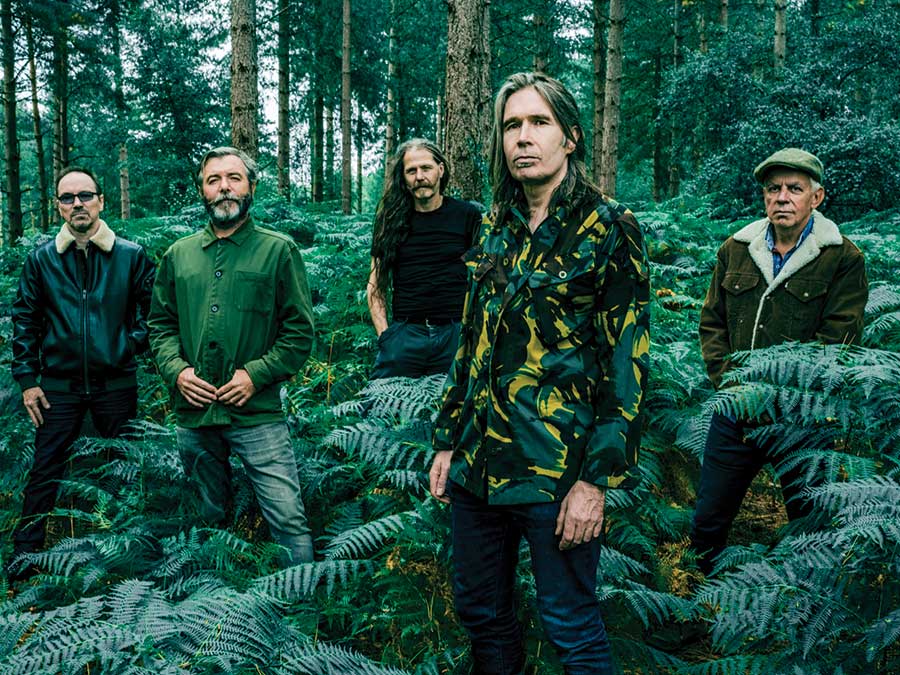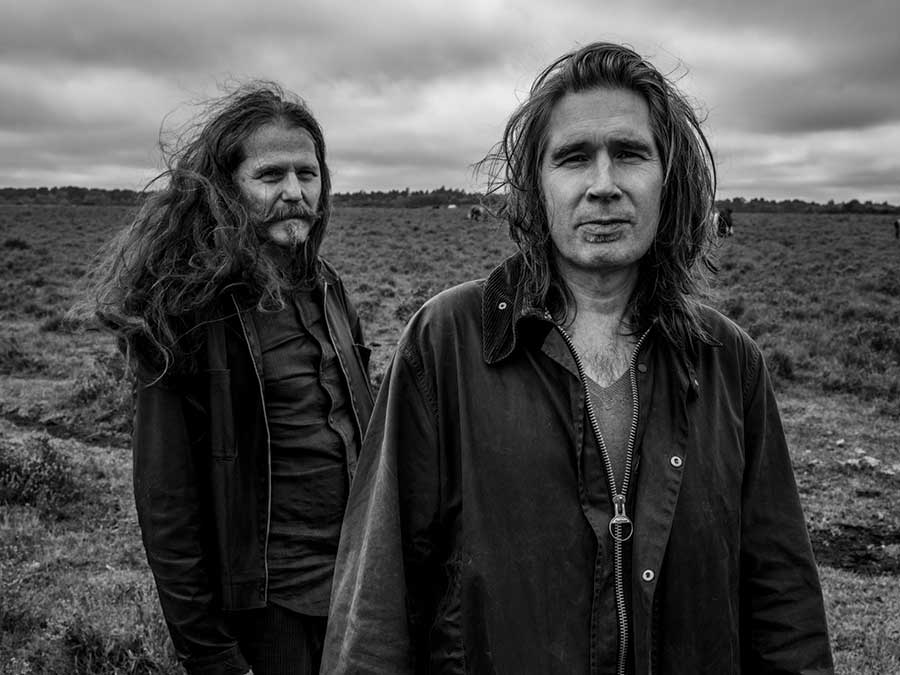
In 2021 Del Amitri returned with Fatal Mistakes – their first new album in 19 years. “If anyone can make a great Del Amitri record, it should be us,” Justin Currie and Iain Harvie told Classic Pop in this interview to mark its release…
Del Amitri finished recording their new album shortly after midnight on Sunday, 22 March 2020 – one day before Nicola Sturgeon and Boris Johnson announced the first UK-wide coronavirus lockdown. Which, for a record that was all about getting the band back together in the same room to lay down their first new material for almost two decades, was something of a close call.
“The record was designed to be performed as live as possible in the studio, so it would have been horrible to try to do it in a lockdown scenario,” says frontman, bassist and principle songwriter Justin Currie. “In fact, we only realised afterwards that it’s the first album we’ve ever made that doesn’t have any session players on it. Everything was played by the five of us.”
“It felt good,” adds Iain Harvie – guitarist, co-writer and Justin’s Dels wingman for the best part of four decades. “Everyone was totally on their game. It felt pretty straightforward, actually – 18 years didn’t seem like a great chasm.”
The result, Fatal Mistakes, recorded over three weeks at a country pile in Gloucestershire with producer Dan Austin (Biffy Clyro, You Me At Six), is a classic Del Amitri record, mixing rootsy rock’n’roll with bruised, world-weary remorse. And that was a very deliberate choice.
“We were definitely trying to make a Del Amitri record,” says Justin. “Iain and I spent a lot of time in the 2000s and early 2010s trying to make music that we thought was Del Amitri, but which nobody else seemed to think was Del Amitri.”
So there was definitely a remit: what constitutes a Del Amitri record?
“That was quite a liberating thing,” says Iain. “A bit of focus is always good. It’s kind of an alter-ego,” he adds, of his role as one fifth of the Dels – alongside Justin, long-time keyboard player Andy Alston, second guitarist Kris Dollimore and drummer Ash Soan. “And it’s quite interesting stepping back into that alter-ego.”
“When you get a bit older, you’re acutely aware of your limitations,” notes Justin. “We know what we’re really good at, and what we can’t do.”
And what they can do is make a great Del Amitri record? “Well if anybody can,” he smiles, “it should be us.”
The march of time since their last record is explicitly acknowledged on album opener (and forthcoming single) You Can’t Go Back, a love song that also nods to the fact that neither Del Amitri nor their fans are getting any younger. It’s an idea the promo video leans into by having the band made up as old men, being pushed around in wheelchairs under tartan blankets.
“The energy’s different,” says Justin of the rock star life at 56. “You’re not vibrating at as high a frequency as you are in your twenties or thirties. Personally, I find the whole process much easier than I used to. Partly because you think: ‘well we sort of know how to do this’. You don’t have something that you’re desperately trying to prove.”

Del Amitri, 2021
As if to underline the fact that they’re no longer living an urgent, do-or-die rock’n’roll lifestyle, Justin briefly has to duck out of our Zoom chat to talk to his GP about an ear infection, while Iain, 58, explains that he’s spent the morning unblocking the kitchen sink. Motley Crüe it ain’t…
It’s all a very long way from Jordanhill School, Glasgow, where the teenage Justin Currie formed Del Amitri Rialzo (the name was specifically designed to be meaningless) in 1980 as a way to emulate his punk heroes like The Fall, Buzzcocks and Television. Iain joined a couple of years later after answering an ad in a shop window. That’s how things worked in the 80s.
Released in 1985, Del Amitri’s (pretty terrific) self-titled debut album was filled with the sort of spiky, angular indie-pop that marked them out as natural successors to Glasgow’s Postcard Records roster, and earned them support slots with The Smiths and Lloyd Cole And The Commotions. But hardly anyone heard it, and in the press notes accompany Fatal Mistakes, the band claim that they “never really cut it as Orange Juice and Josef K copyists”.
Classic Pop begs to differ. “Well there are still people who consider that album to be a work of genius,” concedes Iain. “Which is very misguided, in some ways.” Justin, when pushed, admits to a sneaking admiration for it himself.
But it was to be the band’s last hurrah as indie scenesters: by the time they re-emerged with 1989’s breakthrough Waking Hours LP – awash with lush three-part harmonies, banjo, steel guitar and even the occasional harmonica – it was clear that something in Del Amitri’s chemical make-up had changed drastically.
The shift was partly inspired, says Justin, by the band’s 1986 tour of North America. “That was instrumental, in that we were exposed to a much wider range of influences, and the people who came to see us were exposed to a much wider range of music, including a lot of really mainstream stuff. So that kind of loosened us up a bit.
“Also, the crowds would cheer at the sort of showbizzy elements of the set: if there was a twin guitar thing, or a showy guitar solo, they’d go apeshit. And that wasn’t really allowed in the punk rock, Postcard wars.”
At around the same time, their American manager introduced them to new country artists like Steve Earle, Lyle Lovett and Dwight Yoakam, while their producer Hugh Jones – “who’d been a studio tea boy in the early 70s” – fostered a longstanding love of The Faces and The Rolling Stones.
“Through that, we learned classic songwriting structure,” explains Justin. “Iain and I also started writing separately, and that really changed things a lot.”
Iain also points to the enduring popularity of country and western in Glasgow, along with waves of Irish immigration to the city: “There’s this whole mix of stuff going on, and you hear those influences in a lot of Scottish music.”
Propelled by the success of its signature strum-along anthem Nothing Ever Happens, Waking Hours would be the first of four consecutive Top 10 albums for Del Amitri. But while the music may have taken on more of a classic rock sensibility – with the band adopting “sarcastic” 70s-style ’taches and mutton-chop sideburns to match – the songs still contained a hidden razor-blade in the form of Justin’s acidic, jaundiced and often blackly comic lyrics.
“I turned on a TV station and lip-read with the sound turned down,” he sings on You’re Gone, from Waking Hours.
“It was pro-celeb mouth-to-mouth resuscitation, with Esther Rantzen playing the one who’s drowned.” Or how about his 2007 solo song
“The good thing about having hummable songs is you can possibly scrape into the Top 40, and actually make a living,” muses Justin.
“If you’re making angry sounding music with angry, satirical lyrics, that’s much harder. If you’ve got a sweet little pop tune, you can con people into listening to them. Or you can sweet-talk them into listening to them, anyway. It’s something we always had – we’d write these incredibly sweet, melodic, up-tempo pop songs, but the lyrics always had a sour element to them.”
That sweet and sour mix is perfectly illustrated by the first single from Fatal Mistakes, Close Your Eyes And Think Of England – a heartsick survey of Brexit Britain’s resurgent nationalism wrapped in a swooning, pretty melody that would slip effortlessly into the Radio 2 playlist.
Another protest song, album closer Nation Of Caners – a dense, eight-minute, two-chord diatribe against “science doubters, flabby thinkers, shabby lovers, anti-social fatal drinkers, shirkers, duckers, divers, wankers” – is somewhat less Ken Bruce-friendly.
“It’s certainly a very fertile time for protest songs,” suggests Justin. “They almost write themselves. There’s a lot to be furious about.”
His specialist subject, however, remains his forensic, unflinching deconstructions of failing human relationships – a tradition he continues on Fatal Mistakes with songs like Blind Love (“people toast our survival as if slogging on is living out the dream”) and Second Staircase, in which he gives voice to a man trying to fight the magnetic pull of infidelity.
Unusually for a musician, Justin once said he “doesn’t really buy the concept of the soul”, instead subscribing to “a hardline Darwinian view of nature, where everything we do is part of an enormous subconscious operating system that is trying to gain us advantage in the control of resources, reproductive opportunity and status.” Not exactly Wind Beneath My Wings, is it? Now, though, he seems to be mellowing.
“I personally do believe in the redemptive power of love,” he tells CP. “But it’s very hard to write love songs about that, without sounding twee or saccharine. It’s much easier to write about trouble than it is about bliss. It’s probably laziness. My girlfriend did nag me a few years ago to write a proper love song about her, and I tried. But it was just shite.”
So his personal life is at least happier than the punch-drunk, barfly narrator of so many of his songs? “Erm, happiness is a moving concept,” he says, with a throaty chuckle. But he confirms he’s been with the same partner, Emma, since 2002.
“I’m sure that relationship will have an influence on what I write. Some of the things on this album are very specifically about real people. But a lot of it is imagining a bloke of my age who’s either bitter or not coping in a relationship… that’s definitely projection.
“Basically, the ones where I sound like an absolute bastard, that’s not me.”
In 1995, Del Amitri were chugging along pretty nicely: their previous album, Change Everything, had proved their biggest seller yet, with lead single Always The Last To Know even scraping into the US Top 40. Fourth album Twisted was also doing reasonable – if unspectacular – business, when its brisk, jaunty third single, Roll To Me, suddenly took everyone by surprise by landing in the US Billboard Top 10.
“The weird thing about that song is that we saw it as a bit of an outlier,” says Iain of a track that, clocking in at a shade over two minutes, they initially dismissed as a bit of throwaway fluff. “We weren’t entirely convinced that it would go on the album. But it’s got its own life, that song. There’s something inherent in it that just makes it work as a pop song.”
“Roll To Me made us a lot of money, and still pays its way,” says Justin, who bought his house in Glasgow’s West End with the profits. “Up to that point, we were living from advance to advance. Roll To Me just went through American pop radio like a rash, and stuck there for years.

Iain Harvie and Justin Currie of Del Amitri
“It never translated hugely into album or ticket sales, though. I look back at that and think, in some ways we were quite lucky, because if we’d started to sell millions of records in the States, we’d have become something else entirely. We might have turned into complete arseholes, as opposed to just semi-arseholes.”
“There was a real level of disconnect between the song and the band,” agrees Iain. “A lot of people just consume their music on the radio and they didn’t really know who was singing it.”
“Radio stations liked the record because it was short and breezy, and they don’t really care about telling the audience who it is,” says Justin. “So we had a Top 10 hit in the pop charts, and nobody knew who the fuck we were!”
Two more albums – 1997’s Some Other Sucker’s Parade and 2002’s Can You Do Me Good? – followed, before the band were dropped by their label.
In the years that followed, Justin made four solo albums, while Iain produced records for the likes of The Maccabees and Eileen Rose and, as much to his surprise as anyone’s, studied for a masters in composition at the Guildhall School Of Music And Drama in London, followed by a doctorate at the Royal Conservatoire Of Scotland.
For a band who sold six million records and opened stadium shows for everyone from REM to The Rolling Stones, it often feels like Del Amitri have been quietly airbrushed out of the BBC Four rock-doc version of history: the one that would have us believe Britain moved seamlessly from acid house to grunge to Britpop, with no deviation from
the accepted script. Is that a little bit aggravating?
“No,” shrugs Justin. “Because we had a degree of commercial success in the 90s that allowed us to do what we wanted. We could go out and pretend to be Thin Lizzy on a couple of songs, and pose sort of semi-ironically as rock gods, and take the piss out of that without anyone telling us not to, because we were making money for them. So we’ve never felt remotely resentful. Who cares, at the end of the day? As long as you’re getting to do what you want to do.
“No-one’s ever stopped us from doing what we want to do because we’re not cool or cutting edge. It doesn’t really bother us in the slightest.
“You’d be entirely conceited, doing what we do, to try to place yourself in any kind of historical context,” he adds. “Because I don’t think we’re remotely relevant. And nor should we be. But we did find an audience reasonably early on who seemed to get what we were trying to do. And that’s endlessly satisfying.”
In 2014, that audience demonstrated its continued devotion by turning out in large numbers for the band’s reunion tour, after a break of 12 years. “We were quite aware of the fact that we might not be able to pull it off,” admits Iain. “There was a real possibility for it all to fall on its arse. But one of the first shows we played [to 9,000 people at The Hydro in Glasgow] was one of the biggest we’d ever done, and the response was brilliant.”
“The other thing we’d forgotten is that you’re treated like royalty,” says Justin. “We had caterers. We were like, ‘Fucking hell, what an amazing life!’ I don’t think we appreciated that when we were younger.”

Del Amitri Fatal Mistakes cover
Just as importantly, says Iain, is the sense that the songs have stood the test of time.
“A lot of people in the 80s and early 90s were making terrible sounding records. We were really conscious of that at the time, that a lot of people were making records – even ones with great songs on them – that were trying to sound modern, and just sounded shit. We really took a stance against that.”
So by making records that aspired to sound timeless, they’ve futureproofed themselves against becoming dated?
“We weren’t trying to make them timeless,” says Iain. “We just thought it sounded better.”
Del Amitri did make it onto BBC Four recently, when their 1990 performance of Nothing Ever Happens was shown on the channel’s Top Of The Pops re-runs – during which Justin amused Twitter by live-tweeting his reaction with typically self-lacerating humour (“Ooh, angry look to camera 1. Very effective. You tit.”).
“I’ll admit I’ve been taping them all, just to see us back in the charts again – on the wee chart rundown,” he tells CP. “That’s how sad I am.”
Both men are realistic about the prospects of ever seeing themselves in a singles chart rundown again. But that’s not what life in Del Amitri is about in 2021. It’s all about getting the band back together, making new music and then – when the pandemic situation allows – getting out and playing that music to their sizeable loyal audience.
As we wrap things up, Classic Pop asks Justin for his topline sales pitch for Fatal Mistakes. He thinks for a moment, before offering the most Justin Currie answer imaginable: “Listen to it,” he says, with a knowing smile, “even if you
hate us.”


